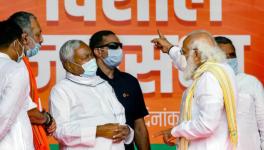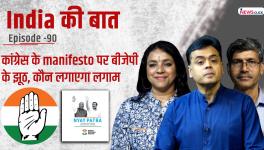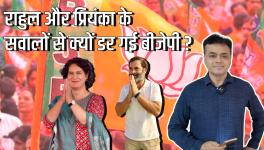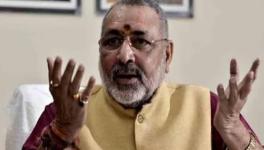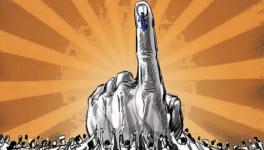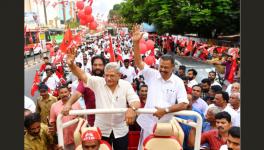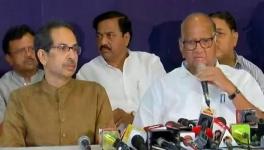Deconstructing One Rank One Pension
Newsclick interviewed the human rights activist Gautam Navlakha on the issue of One Rank One Pension (OROP). Navlakha said a verbal assurance cannot be accepted as a serious step in implementing the OROP. There is no clarity on PM's announcement. He brings out the policy of NDA government which gives more significance to the militarization of the country, than to the welfare measures of the common people. When there is a decline in public sector jobs, more than 50% of the government jobs fore-casted in 2015-16 belong to armed forces which are going to be consuming public money. Navlakha says the politicization of armed forces would be a problem if there is no democratization of it. A close examination is needed at the moment since there are number of issues and backwardness in the defense policies such as introducing Dogra certificates for solders' recruitment, continuing the policies of the British Raj, etc.
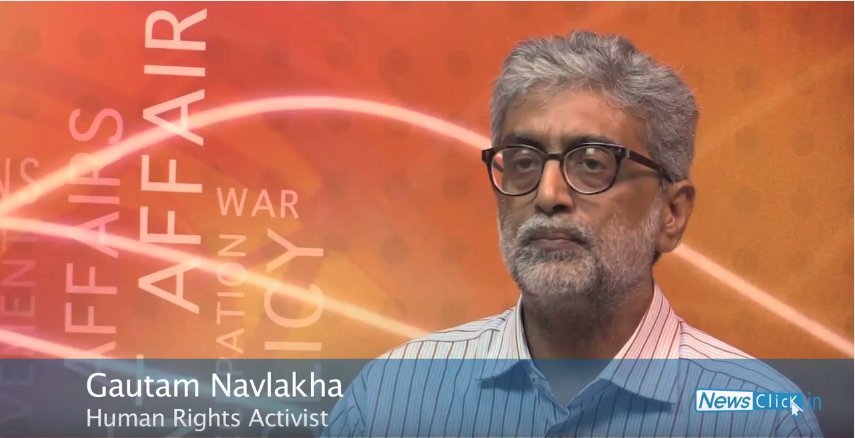
Rough Transcript:
Pranjal - Hello, welcome to Newsclick. Today we have with us Gautam Navlakha, eminent human rights activist, who is extensively worked on the issue of militarisation. We are going to discuss about One Rank One Pension issue (OROP). What is the entire issue of One Rank One Pension? What was the organisation of ex-military men demanding from the government?
Gautam Navlakha - One Rank One Pension means that, whoever retires from the military gets the same pension as irrespective of the year in which he retires but having served the same number of years must get the same pension as the last person who is getting it. In a nut shell, this is what equalisation of salaries means. So it means that if 20 years ago somebody retired and was getting lower pension and somebody who retires today, 20 years later at the same rank, having found same number of years gets higher pension then there would be an equalisation between them.
P - So what was the demands? There were various portions in the demand, the ex-army men organisation demanded to review to keep a time period for the pensions. So what has the government given in response on those demands?
GN - Actually the government is given nothing much in a nutshell because formal announcement yet to come. So whatever Mr. Modi may have promised in his speeches or Parrikar assured the ex-servicemen verbally must be, it is only when you see the paper which carries the formal announcement, which list that the people would come to know exactly what has been conceded and what is the implication of it? There are several issues; for instance, one of the sticking point is, not only the periodicity of this equalisation, whether it should be done annually or it should be done five years. The government has proposed five years. Now this is suppose to come into play from 1st July 2014. The payments will be made in 2015.
P - And base year I believe 2013.
GN - Now what it mean is, there are two issues here. What the servicemen don't know is, now that the government announced, it will be done in five years. Those five years, they will have to wait for five years now to see for equalisation of pay or will it be done now? because the 7th pay commission is going to come-out in January 2016, will they be covered also by that? There is a confusion on that count and its a very serious because suppose for instance, this comes into play from this year onwards, OROP, the government is announced. If it becomes due now according to the government announcement, the revision will taken place in 2018. In between the 7th pay commission would have come-out with its report. Now would this 7th pay commission award also apply to them or not is an issue. They do not know anything abut that. Then there is a confusion about the whole question about; see Mr. Parikar on Saturday, when he announced formally, he made it very clear that OROP will not apply to those who have retired voluntarily, correct? Now what is not been clear is, when the Prime Minister clarified, whether his clarification applies only for personal below officer rank or also to the officers? Because a large number of officers, either compulsory retired of after 20 years, can seek voluntarily retirement, or the government is making a distinction between the two. It is like penny pinching actually. Government is trying it's level best to reduce it's burden which is going to be exorbitant and I think thats an issue that has to also be kept in mind.
P - When we look at the expenditure that the government is incurring on different sector, it is quite huge and major portion of our GDP. So will this extra burden that the government may have? Will it be part of defense budget itself or will there be any other specific allotment made to it?
GN - Let us keep two things in mind. Defense pensions, unlike the civil pension of government of India, the difference between two is, from 2004 after the pension reforms introduced, the national pension scheme that was introduced, became a contributory pension, so 10% of the basic civil government employees' is also deducts. So they contribute 10% of that and the government matches that. In the case of defense personal, the entire amount is borne by the exchequer. So it is the public fund which pays for it. There is that difference to be kept in mind. So therefore the impact of any hike in pension, would be felt differentially by the civil as well as the defense pensions. That is one. But let us look at the size of the defense pension. The total defense outlay in 2015-16 according to the government of India, volume-2 of the expenditure budget of the ministry of finance makes sit very clear that, 54500 crores rupees is the estimate defense pension which was allocated. Against that, 26285 crores are civil pensions. So the total burden comes to about 80000+ crores, which is a significant amount. Now with One Rank One Pension coming into play, there is a confusion about what would be the financial outgo on account of that? Government is not very forthcoming on that. They are very cagey about that. So even when the minister of state for the ministry of finance, Jain Sinha talked about, it is not going to have any impact on the physical deficit, etc and said this is coming within our capacity to absorb and all that, was completely silent. Well, he dangled figure of recurring expenditure as being the range of 8000 to upto 10000 crores, as far as arrears were concerned, he was completely and scrupulously silent and thats where it is going to bite in the short term. And other estimate suggests that, it would probably defense pension would raise probably to 74 or 75000 crores rupees in 2015 and 2016. The important thing about defense pension is that, in 3 years time estimated with recurring expenditure being worked, the size of the defense, I mean it would rise to about a lakh. Now this is an account of the sheer size of the defense force and defense pensioners in the country. Now there is a confusion also about numbers.
P - There is a major confusion also around the government is hiking the DA of various central government employees. There is a confusion around that also, like day before yesterday, the government is planning to around 6% hike in the DA. So would you like to comment something on that?
GN - That also shows in terms of, since the wages are induct to the consumer price index. Government has allocated roughly 6700 crores as additional. But this is also something which impacts defense pensioners. Because this is for the government employees, those currently working. The pension will get impacted only by the 7th pay commission onwards. So will have to wait and see what happens there. In the similar case for defense persons, they will have to wait and see exactly what the formal commitment is on the government side to know exactly what would happens to the wages; whether it is going to be and how much of it's going to be indexed to the raising prices? and whether they will be covered by it or not and when? So these are still issues but there is another issue which is very important. As far as you look at the budgetary account, there is reason to argue that, the expenditure that the government incurs on account of its sprawling bureaucracy is actually not so high. Please remember in the country like India, the largest employment generation source continues to remain the government sector and in a time where there has been a jobless growth in the country, and industry's performance in terms of creation jobs has been rather poor, government sector therefore remains and it's increase in government sector by itself is not something which necessarily is a bad thing for the country. The issue is what kind of employment are you generating? and thats where the question of defense pensions and defense personal comes to the picture. If you look at one of the interesting things about our country is, that is out of, roughly 2.5 lakh of jobs that are going to be created according to Government of India as far 2015-16, it's budget account shows, 50% of them are going to be raised in the armed forces. Now this is a wasteful engage. You are increasing actually the burden on the public exchequer by increasing the pension costs, rather than cutting them. So cutting down the size of the forces, man power augmentation, as world over taken place and armies have trimmed down in terms of the personal, it is the opposite direction we have been moving. And if the new command that suppose to come-up, the new mountain cops that was coming up, which would have meant an additional 90000 jobs; soldiers being recruited, which is been cut down but not given-up completely, its only been staggered; only means that we are moving in the opposite direction of augmentation of man power, which means that there are defense burden and the outgo is count to continue to increase. This is harmful. Creation of public sector jobs, it say education, health, public health engineering, etc which actually going to creation of public assets and social capitals are very welcome and needed in the country like us. So in seeking defense pension, we must also bring-in this dimension I believe because it shows you, how by diverting scarce resources into wasteful expenditures, we are actually restricting the resources available for the social sector.
P - When we talk about OROP for defense personal, we also tend to forget the various paramilitary forces, the CISF, the CRPF and the Police which has been kept untouched, the police reforms have not been brought-in. The bureaucrats may also stand-up and demand One Rank One Pension. So what do you have to say about that?
GN - It is very interesting that the central paramilitary forces have been pitching and they have said that OROP should be extended to central paramilitary forces and their claim is, they are engaged as much in being in the front line of country's defense because they are the ones who are fighting at home. Now it is very alarming situation because fighting at border, defending the borders has something noble associated with, but fighting against your own people is very immorable pursuit in itself. So to claim privileges and rank of martyrdom for your personnel, who are fighting against your own people, actually raises many questions about, also the nature of Indian state in a way, I mean how the extend of it's anti-peopleness so to say. So there is something that I would like to bring-in also here which is significant. Two aspects I would like to draw your attention. OROP agitation, a lot of very close observers have pointed out, this is a new kind of politisation of armed forces that is taking place. Now per se, politicisation of armed forces is not bad if it results in democratisation of the armed forces because that is a serious problem. You see, there is a devision between the officers, who are at the front rank of the ex-servicemen's association and the personnel below the officer rank who are organised by another organisation, I forgot the name but they have another organisation of the PBORs. Their demands are slightly different. They point out for instance that the officers comprises only 2.5% of the personnel but corner 10% of the resources. So there is a mismatch between what they constitute and the resources that they control. Then they point out that there is something called special allowance that is provided to soldiers on the battle front. Where the solders point out that, in fact the soldiers are the ones who are facing the bullet of the enemy. They are the front rank, yet there is a difference in that allowance which is paid to an officer and to a soldier. Is it we are threaten by the same threat? yet we get different wages? should there be not an equal wage? where your actual situation, I mean an allowance which is related to your an operation, where everybody is the same. Should it not be the same? There are many issues, plus there is issue about why is it that the personnel below the officers' rank get adversely affected by the military tribunal system of justice? and its officers who go on to comprise of the court marshal board, even when they are the perpetrators can escape because they are the ones who also form the court marshal proceedings. So there is a need to take another look at something which we have so far not looked into at the army act, which is actually a colonial act, with minor changes and modifications in the act which was adapted in 1950.
P - When we look a the recruitment process itself, the way the upper rank officers are recruited and the way jawans are recruited. This has stark difference between the education provided to them within the armed force itself which you have already told about. This also influences the entire process of democratisation within the army itself?
GN - Since you have raised the recruitment of the soldiers, I wold like to actually bring-in something if you allow me a minute. It is very interest that the Ministry of Sate and Prime Minister's office, Mr. Jitendra Singh has come out with this fantastic idea of something called a Dogra cirtificate. Now it is a fact that the UPA which has introduced and promoted the idea of Dogra cirtificate which means relaxing certain criterias for recruitment of soldiers from areas. Now it was restricted only then to Dogra Hindus, the 'Dogras', therefore the name 'Dogra cirtificate'. The argument of Mr. Jitendra Singh and that is something which should prick our ears, is that this was something that British had discovered. That there are certain people residing in some areas who can be made soldiers. So people who reside in Kanti areas of Jammu for instance, like the Kummavu or the Jat regiment or Sikh regiment or Mahar regiment, Gurkha regiment, etc all recruited in certain key areas which have been found to result in very fine soldiers. Now this is an extremely retrogressive and reactionary policy. We have claimed actually if you recall in during the Sachar commission time, when Sachar commission wanted census, community wise senses, religious profile of the Indian army, the army had put it down and saying that the Indian army is secular army and there is no difference. We know for a fact that there are 40% of regiments which are actually ethnicity or caste based or religion based in this country. We also know that there is no proportional representation of people from across the length and breadth of the country, comprising different sections and different kind of people or community who reside and go up into making India. When you don't have it and somebody like BJP's Jitendra Singh comes out with the noxious idea of introducing Dogra, then it would only shows the kind of time we are living, where we are moving backward rather than forward. It is therefore interesting that One Rank One Pension debate, an agitation has provided an opportunity to start looking at armed forces much more closely and number of issues that are related, much more closely than we have done so far.
P - Thanks Gautam for giving us your time and as the things proceed as you said would stop here. We will be coming back to you on such issues. Thanks a lot.
DISCLAIMER: Please note that transcripts for Newsclick are typed from a recording of the program. Newsclick cannot guarantee their complete accuracy.
Get the latest reports & analysis with people's perspective on Protests, movements & deep analytical videos, discussions of the current affairs in your Telegram app. Subscribe to NewsClick's Telegram channel & get Real-Time updates on stories, as they get published on our website.









